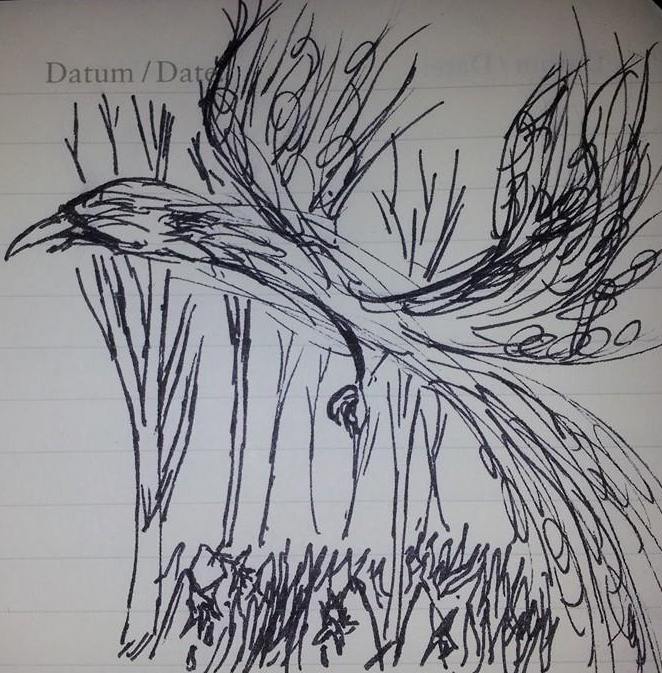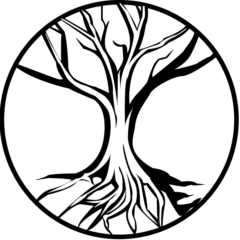I’m a writer. Writers love words, right?
Well, yes. It’s hard to write without words. They are the building blocks of how we communicate. They join together to form streams of ideas, which then fork out into a tributary of arguments, developments, thoughts, emotions…quite frankly words are quite useful little things.
I’ve dropped the intensity of that sentence off a hypothetical crumbling cliff on purpose right there. I’ve been thinking lately quite a lot on how much we experience the world without words. Unfortunately the only way to try and tackle this concept of thinking without words is to think about it with words, but that’s just one of those lovely paradoxes that always end up appearing when you think too much.
I’ll start by sharing a quote I’ve found recently. Here’s some wisdom from Terence Mckenna.
“Culture replaces authentic feeling with words. As an example of this, imagine an infant lying in its cradle, and the window is open, and into the room comes something, marvelous, mysterious, glittering, shedding light of many colors, movement, sound, a transformative hierophany of integrated perception and the child is enthralled and then the mother comes into the room and she says to the child, “that’s a bird, baby, that’s a bird,” instantly the complex wave of the angel peacock iridescent trans-formative mystery is collapsed, into the word. All mystery is gone, the child learns this is a bird, this is a bird, and by the time we’re five or six years old all the mystery of reality has been carefully tiled over with words. This is a bird, this is a house, this is the sky, and we seal ourselves in within a linguistic shell of dis-empowered perception.”
~ Terence Mckenna The World Could Be Anything (1990)
found here. https://www.facebook.com/EtherealExposition/photos/a.144806929042766.1073741829.144767382380054/321604901362967/?type=1&theater
Do you know that feeling when you experience something new for the first time? Maybe not. Maybe you haven’t experienced something new for a while, but I doubt that. maybe you’re in the position that Mckenna describes, that you have abstracted everything to the point where there is no wonder in them anymore. Take the view of a young child, pointing at everything in excitement on a walk in a forest
“what’s that? that crying flower? Why does it look so sad? Look! It’s crying!” “that’s just a daffodil. That’s just a drop of rain, falling from it’s leaves”
“What’s that noise? It sounds like the ground is shaking! the forest is awake!” “No, that’s just a woodpecker – look! There it is, in that tree.”
“But what is the tree dreaming of? Is she happy?” “no, it’s just a tree.”
Who’s right?
Already a young child has abstracted some things. Bird, tree, flower. We need to so we’re all on the same wavelength and able to talk with each other. But children still have so much more to see, so much more to turn from wonder into the normal. You know when a baby stares at the seemingly most mundane object, in wonder? What if we could do that? why don’t we? I think it’s something to do with everything just being ‘just’ something.
Just a daffodil. Just a woodpecker. Just a tree.
Of course, words are how we communicate with one another. i couldn’t write this to you all unless you partake in this word game known as the English language. Yet as soon as words are placed on something some of the beauty is lost. Let’s take hypnogogia as an example. Most people don’t know what this is, but we’ve all experienced it to varying degrees.
Hypnogogia is the transitional state between sleep and wakefulness. during it we see swirling colours which sometimes form shapes. It’s beautiful. Sometimes unexplainable. I could spend hours writing about it and never quite reach what it actually is. It’s more beautiful in the fact that I can’t full explain it.
In most languages, the script in which something is given its name is biggest abstraction of all. what is ‘t’ on its own? It’s a sound. it’s a shape. It means nothing. How about ‘ttttttt’? now it’s just a meaningless shape. You can’t pronounce that. And then ‘t t t t t t’? now they are shapes and they make a sound. Still no recognisable meaning though. we could attach meaning to the sound though – that ‘t t t t t t’ could describe the tattattattat of the woodpecker in that forest. We’ve applied a total abstraction to a sound/action. And now that action is a collection of meaningless abstractions. This extends to actual words. What does ‘w-o-r-d’ say about the word word? Nothing.
Let’s compare that to Chinese, where the writing sound isn’t totally abstracted. put ÕÑ│(nü)(woman) with Õ¡É(zi)(child) and you get ÕÑ¢´(hao)(good). Aside from the fact that the idea portrayed there is a rather traditional view, a woman and child together meaning ‘good’ is very clever and quite beautiful.
Each concept in life has however still been boiled down to a few strokes on paper, even in the Chinese. The words are less abstract, but they do still serve the purpose of defining something in a generic term we all understand, removing part of the personal experience.
What do you experience when you read a novel? Many people who read fiction incessantly might talk of really knowing the characters in their favourite book, and of really feeling the emotions of the character, the environments of the story, a life brought onto those words. The words translate into images. You interpret them into something more. Yet you are always restrained by the author’s choice of words, and your own interpretation of them.
An imaginative reader might get close to the feeling of the unexplained, through extrapolating what they have been told and making it into something new. a great example of this is not with literature but with art. Dürer’s famous rhinoceros. He had never seen a rhino, but he had a great go at sculpting and drawing one on written accounts of their appearance. He got close, but not quite there. That’s what words are like – you can have a good go at explaining something, but you will never truly have the whole image.

And now here’s another quote I found over the last few days, this time a criticism of written word.
“The only possible opening for a statement of this kind is that I detest writing. The process itself epitomizes the European concept of “legitimate” thinking; what is written has an importance that is denied the spoken. My culture, the Lakota culture, has an oral tradition, so I ordinarily reject writing. It is one of the white world’s ways of destroying the cultures of non-European peoples, the imposing of an abstraction over the spoken relationship of a people.” – Russel Means
http://www.blackhawkproductions.com/russelmeans.html#sthash.NLTJbUpd.dpuf
Although this quote only indirectly affects what was written before it, the divide between spoken word and written word is interesting. The idea I want to look at here is this ‘Legitimate thinking’. When you speak words, those words are accompanied with facial expressions, rise and fall in tone and movement. It’s a marriage of total abstraction and part-abstraction. Conversation allows further discussion of the most disputable points of meaning. The written word lacks that. When words are written to describe something – anything even – no matter how beautiful, chances are that moment would have been more beautiful without them.
My leaving note will be this. Do you know those moments when you think “I don’t have the words” to describe something incredible? Maybe we shouldn’t try.
on…words and lost meaning


Best post you ever did…
Really? Thank a lot! It was a really unpopular post, but I was fairly happy with it, so at least somebody noticed it! Why is it the best post, if you don’t mind me asking? …
Makes people think about how words are used… not what they mean, but how they fulfill their function. They make communication ideas possible, but they can also hinder that when we use them as shortcuts or assume things about their meaning.
ok, cool. I’m sure you know I like to hear what people see in my articles, so thanks for that. And of course, you’re completely right.
I always am… ha
and that is what my song, Walls Of Stone, is all about